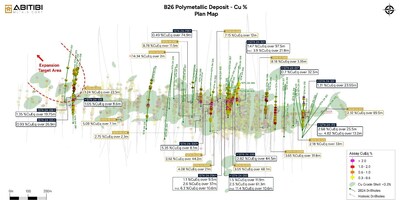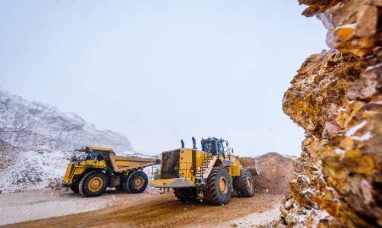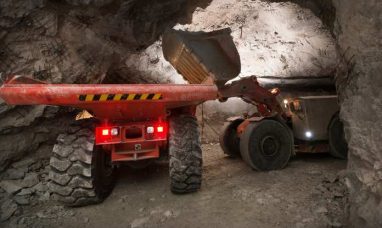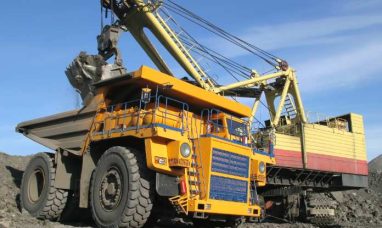Highlights:
- The Company has received results from drillholes 1274-24-312-313, and 331-332 highlighted by the following intervals:
- #312 – 1.31% CuEq over 23.55 metres beginning at 114.15 metres depth, including 5.4% CuEq over 2.75 metres.
- #313 – 2.68% CuEq over 25.5 metres beginning at 189.0 metres depth, including 4.82% CuEq over 13.15 metres.
- The results from #312 and #313 infilled the mineralization on the eastern side of the B26 Main Deposit close to the limit of the known deposit, improving on the grades identified in historical drilling.
- Assay results from eastern extensional holes #315 and #320 to #323 are pending where the Company has seen positive visuals.
- The Company remains well funded with $18.0 million to complete the remaining 16,500 metres planned for the 2024 work program as well as an additional 20,000 metres in 2025, which will be incorporated into a Preliminary Economic Assessment to complete the B26 option.
LONDON, ON, May 16, 2024 /CNW/ – Abitibi Metals Corp. (CSE: AMQ) (OTCQB: AMQFF) (FSE: FW0) (“Abitibi” or the “Company”) is pleased to announce results from the 13,500-metre maiden drill program at the B26 Polymetallic Deposit (“B26”, the “Project” or the “Deposit”) completed under the first phase of a fully funded 30,000-metre 2024 field season. Abitibi Metals is fully funded with $18.0 million to complete the remaining 16,500 metres planned for the 2024 work program, as well as an additional 20,000 metres in 2025, which will be incorporated into a Preliminary Economic Assessment to complete the option. On November 16th, 2023, the Company entered into an option agreement on the B26 Deposit to earn 80% over 7 years from SOQUEM Inc. (see news release dated November 16, 2023).
Jonathon Deluce, CEO of Abitibi Metals, commented, “We are excited to announce results from the eastern sector of the B26 Deposit, intercepting 2.68% CuEq over 25.5 metres in #313. We have successfully better defined the mineralized zone at the eastern limit of the B26 Deposit. These are the starting results from the eastern drilling where extensional holes are still outstanding from #315, 320-323, where we have seen positive visuals. With the copper price continuing to break out, projects like B26, located in the world-class jurisdiction of Quebec, stand out globally for their potential to deliver critical metals at a time when there is a clear rising need for copper.”
Mr. Deluce continued: “We are in an excellent position for the coming months, with $18 million in our treasury. This funding will support the 16,500 meters of drilling planned at B26, as well as an additional 20,000 meters in 2025. We expect to continue to have plenty of news in the coming weeks, including results from the remaining 19 holes.”
B26 Eastern Extension
The B26 Main Deposit has a continuous strike length of 1.0 kilometers and mineralization has been drilled to 850 metres in vertical depth with limited drill coverage below 500 metres.
Holes 1274-24-312 to 1274-24-313 were drilled as part of a series of holes planned to fill 50 to 100 metre gaps in the section to better define the deposit at its eastern margin. Other objectives covered by newly drilled holes were to open ground up-dip from known mineralization to cover from bedrock surface to a depth of 100 metres. Also, the use of longer holes in this area of the deposit, when compared to historical drilling, has tested the mineralized corridor footwall.
The best intercept in drill hole 1274-24-313 was 2.68% CuEq over 25.5 metres, beginning at 189.0 metres. It was drilled at close range to 1274-13-87 to expand the known mineralization down hole. 1274-24-312 intercepted 1.31% CuEq over 23.55 meters and was drilled up-dip to test the bedrock interface extension about 15 metres above historical hole 1274-13-89.
B26 West
Holes 1274-24-331 and 1274-24-332 were drilled on the western limit of the B26 Deposit to test the lateral continuity of the main lens near surface. A spacing of 25 metres was used to infill the actual grid. Three pluri-metric mineralized intercepts were obtained from hole 1274-24-332 at different positions in the hole, from 117 metres to 262 metres down hole (see following table). Our program wide interpretation will investigate the relation of all components of the system.
Table 1: Significant Intercepts
|
Hole ID |
From (m) |
To (m) |
Length (m) |
CuEq (%) |
Cu (%) |
Au (g/t) |
Ag (g/t) |
Zn (%) |
|
1274-24-312* |
114.15 |
137.7 |
23.55 |
1.31 |
1.04 |
0.25 |
9.93 |
0.1 |
|
incl. |
115.15 |
117.9 |
2.75 |
5.40 |
4.10 |
1.10 |
52.80 |
0.52 |
|
1274-24-313 |
189 |
214.5 |
25.5 |
2.68 |
2.36 |
0.36 |
9.45 |
0.04 |
|
incl |
193.85 |
207 |
13.15 |
4.82 |
4.26 |
0.64 |
15.43 |
0.07 |
|
and |
225 |
235 |
10 |
1.37 |
0.98 |
0.53 |
3.93 |
0.04 |
|
1274-24-331 |
170.7 |
175.5 |
4.8 |
1.28 |
1.01 |
0.34 |
4.76 |
0.01 |
|
1274-24-332 |
117.25 |
123 |
5.75 |
0.72 |
0.67 |
0.04 |
3.28 |
0.01 |
|
and |
130.1 |
132.6 |
2.5 |
1.32 |
1.09 |
0.29 |
4.68 |
0.007 |
|
and |
257.9 |
262 |
4.1 |
0.83 |
0.67 |
0.17 |
3.53 |
0.47 |
|
Note 1: The intercepts above are not necessarily representative of the true width of mineralization. The local interpretation indicates core length corresponding to 70 to 80% of the mineralized lens’ true width. Note 2: Copper equivalent values calculated using metal prices of $4.00/lb Cu, $1.50/lb Zn, $20.00/ounce Ag and $1,800/ounce Au. Recovery factors were applied according to SGS CACGS-P2017-047 metallurgical test: 98.3% for copper, 90% for gold, 96.1% for zinc, 72.1% for silver. Note 3: Intervals were calculated using a cut off grade of 0.1% Cu Eq, which represents the visual limit of the mineralized system. * Further assays are outstanding from this hole |
||||||||
Table 2: Drill Hole Information
|
Drill hole |
Target |
UTM |
UTM |
Elevation |
Azimuth |
Dip |
Length (m) Drilled |
|
1274-24-312 |
B26 Main |
653350 |
5513314 |
276 |
360 |
-49 |
282 |
|
1274-24-313 |
B26 Main |
653350 |
5513275 |
276 |
360 |
-56 |
342 |
|
1274-24-331 |
B26 Main |
652500 |
5513320 |
276 |
360 |
-47 |
321 |
|
1274-24-332 |
B26 Main |
652503 |
5513364 |
276 |
360 |
-50 |
399 |
The core logging program is run by Explo-Logik in Val d’Or, Quebec. The drill core was split with half sent to AGAT Laboratories Ltd. and prepared in Val d’Or, Quebec. All samples are processed by fire assays on 50 gr with atomic absorption finish and by “four acids digestion” with ICP-OES finish, respectively, for gold and base metals. Samples returning a gold grade above 3 g/t are reprocessed by metallic screening with a cut at 106 µm. Material treated is split and assayed by fire assay with ICP-OES finish to extinction. A separate split is taken to assay separately mineralized intervals with target grades above 0.5% Cu using Na2O2 fusion and ICP-OES or ICP-MS finish.
Samples preparation duplicates, varied standards, and blanks are inserted into the sample stream.
In the 2018 resource estimate, SGS recommended the QAQC protocol to explain the replicability for the four metals (Au-Cu-Ag-Zn). The Company has set up for this program a series of assaying protocols with the objective to control QAQC issues from the beginning of the project. As a result, samples are crushed finer with 95% of particles passing 1.7 mm and a large split of 1 kg is pulverized down to 106 µm (150 mesh). Other measures put in place include the automatic re-assaying of gold results above 3 g/t by metallic screening and the use of sodium peroxide fusion in mineralized intervals interval corresponding to a target grade above 0.5% Cu.
Information contained in this press release was reviewed and approved by Martin Demers, P.Geo., OGQ No. 770, a qualified person as defined under National Instrument 43-101, and responsible for the technical information provided in this news release.
Abitibi Metals Corp. is a Quebec-focused mineral acquisition and exploration company focused on the development of quality base and precious metal properties that are drill-ready with high-upside and expansion potential. Abitibi’s portfolio of strategic properties provides target-rich diversification and includes the option to earn 80% of the high-grade B26 Polymetallic Deposit, which hosts a historical resource estimate1 of 7.0MT @ 2.94% Cu Eq (Ind) & 4.4MT @ 2.97% Cu Eq (Inf), and the Beschefer Gold Project, where historical drilling has identified 4 historical intercepts with a metal factor of over 100 g/t gold highlighted by 55.63 g/t gold over 5.57 metres and 13.07 g/t gold over 8.75 metres amongst four modeled zones.
SOQUEM, a subsidiary of Investissement Québec, is dedicated to promoting the exploration, discovery and development of mining properties in Quebec. SOQUEM also contributes to maintaining strong local economies. Proud partner and ambassador for the development of Quebec’s mineral wealth, SOQUEM relies on innovation, research and strategic minerals to be well-positioned for the future.
ON BEHALF OF THE BOARD
Jonathon Deluce, Chief Executive Officer
The Company also maintains an active presence on various social media platforms to keep stakeholders and the general public informed and encourages shareholders and interested parties to follow and engage with the Company through the following channels to stay updated with the latest news, industry insights, and corporate announcements:
Twitter: https://twitter.com/AbitibiMetals
LinkedIn: https://www.linkedin.com/company/abitibi-metals-corp-amq-c/
Neither the Canadian Securities Exchange nor its Regulation Services Provider accepts responsibility for the adequacy or accuracy of this release.
Note 1: A qualified person has not done sufficient work to classify the historical estimate as current mineral resources or mineral reserves. The issuer is not treating the historical estimate as current mineral resources or mineral reserves. Source: Rapport Technique NI 43-101 Estimation des Ressources Projet B26, Québec, For SOQUEM Inc., By SGS Canada Inc., Yann Camus, ing., Olivier Vadnais-Leblanc, géo., SGS Canada – Geostat., Effective Date: April 18, 2018, Date of Report : May 11, 2018
Note 2: Copper equivalent values calculated using metal prices of $4.00/lb Cu, $1.50/lb Zn, $20.00/ounce Ag and $1,800/ounce Au. Recovery factors were applied according to SGS CACGS-P2017-047 metallurgical test: 98.3% for copper, 90% for gold, 96.1% for zinc, 72.1% for silver.
Note 3 – Sources:
Fayard, Q, Mercier-Langevin, P., Wodicka, N., Daigneault, R., & Perreault, S. (2020). The B26 Cu-Zn-Ag-Au Project, Brouillan Volcanic Complex, Abitibi Greenstone Belt, Part 1: Geological Setting and Geochronology.
Fayard, Q. (2020). CONTRÔLES VOLCANIQUES, HYDROTHERMAUX ET STRUCTURAUX SUR LA NATURE ET LA DISTRIBUTION DES MÉTAUX USUELS ET PRÉCIEUX DANS LES ZONES MINÉRALISÉES DU PROJET B26, COMPLEXE VOLCANIQUE DE BROUILLAN, ABITIBI, QUÉBEC.
Forward-looking statement:
This news release contains certain statements, which may constitute “forward-looking information” within the meaning of applicable securities laws. Forward-looking information involves statements that are not based on historical information but rather relate to future operations, strategies, financial results or other developments on the B26 Project or otherwise. Forward-looking information is necessarily based upon estimates and assumptions, which are inherently subject to significant business, economic and competitive uncertainties and contingencies, many of which are beyond the Company’s control and many of which, regarding future business decisions, are subject to change. These uncertainties and contingencies can affect actual results and could cause actual results to differ materially from those expressed in any forward-looking statements made by or on the Company’s behalf. Although Abitibi has attempted to identify important factors that could cause actual actions, events or results to differ materially from those described in forward-looking information, there may be other factors that cause actions, events or results to differ from those anticipated, estimated or intended. All factors should be considered carefully, and readers should not place undue reliance on Abitibi’s forward-looking information. Generally, forward-looking information can be identified by the use of forward-looking terminology such as “expects,” “estimates,” “anticipates,” or variations of such words and phrases (including negative and grammatical variations) or statements that certain actions, events or results “may,” “could,” “might” or “occur. Mineral exploration and development are highly speculative and are characterized by a number of significant inherent risks, which may result in the inability of the Company to successfully develop current or proposed projects for commercial, technical, political, regulatory or financial reasons, or if successfully developed, may not remain economically viable for their mine life owing to any of the foregoing reasons, among others. There is no assurance that the Company will be successful in achieving commercial mineral production and the likelihood of success must be considered in light of the stage of operations.
SOURCE Abitibi Metals Corp.

Featured image: DepositPhotos © Iurii












